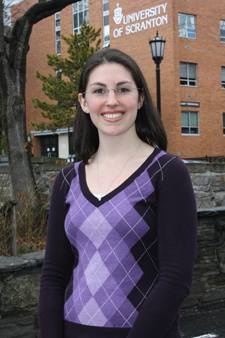Scranton Student Earns Prestigious Goldwater Scholarship

The ninth University of Scranton student in the past nine years has earned one of the nation’s most coveted honors in science, mathematics and engineering – the Barry M. Goldwater Scholarship. Abbe Clark, a biochemistry, cell and molecular biology major, joins just 274 other sophomore and junior college students in the United States to be awarded a Goldwater Scholarship for the 2011/2012 academic year. A member of Scranton’s class of 2012, she is one of only six students attending a Jesuit university to be recognized.
The 2011 Goldwater scholars were selected on the basis of academic merit from 1,095 mathematics, science and engineering applicants, who were nominated by the faculties of their colleges and universities.
According to Mary Engel, Ph.D., director of health-professional school placement and fellowship programs at The University of Scranton, the Goldwater Scholarship recognizes excellence in research as well as exceptional academic achievement in scientific fields.
A native of Scranton now residing in Southold, N.Y., Clark joins two other current University of Scranton students who are also Goldwater scholars: Maria A. Gubbiotti of Falls (named a scholar for 2010/2011) and Melissa Wasilewski of Clarks Summit (named a scholar for 2009/2010 and 2010/2011). Both Gubbiotti and Wasilewski will graduate in May and pursue M.D./Ph.D. programs.
Clark maintains a 3.97 grade point average as a member of The University of Scranton’s prestigious Honors Program. She has participated in the Faculty Student Research Program with Timothy Foley, Ph.D., associate professor of chemistry and the Goldwater Scholarship faculty advisor at Scranton, and she is currently conducting research for her honors thesis under his direction.
“Abbe is an especially bright student and a rising star, possessing both great enthusiasm for biomedical science and enormous potential as a researcher and student mentor,” said Dr. Foley.
Clark is part of a team in Dr. Foley’s lab investigating modifications of proteins in the brain, particularly oxidative modifications, that may be related to aging and disease. She has co-authored an abstract entitled “Probing Disulfide Bonding in Vivo Using Immobilized PAO-Affinity Chromatography” that was accepted for presentation at the upcoming annual meeting of the American Society for Biochemistry and Molecular Biology.
Clark said her research “involves the identification of the biochemical properties that confer a sensitivity to oxidative stress on a particular subset of proteins. This will lead to a greater understanding of the mechanisms by which cells respond to oxidative stresses.”
In less clinical terms, Clark explained that “cellular processes in all areas of the body are dependent on oxidation-reduction reactions, or the loss and gain of electrons. A prolonged imbalance in these reactions, with a particular shift towards oxidation, is associated with neurodegenerative diseases.” The research she is conducting with Dr. Foley is a piece of this puzzle.
Clark began working with Dr. Foley the summer after her freshman year.
“The University of Scranton provides opportunities for research that you cannot get as an undergraduate at a larger school,” said Clark. “Students are able to collaborate directly with professors, which is great preparation for graduate school when students are expected to work more independently.”
In addition to her research at Scranton, Clark was awarded a fellowship to the 2010 Summer Undergraduate Research Program at Mount Sinai School of Medicine in New York, N.Y. There she worked under the supervision of Cathie Pfleger, Ph.D., to identify new tumor-suppressors or oncogenes for the “Hippo Pathway” in Drosophila (a small fruit fly).
Clark loves exploring the intricate ways in which cells “communicate” with each other and plans to pursue a Ph.D. in cellular biology focusing on cell signaling.
“We communicate with words and expressions. Cells use molecules to send signals that have to then be received and interpreted. This involves a complex sequence of steps that must be followed exactly for a reaction to occur,” said Clark enthusiastically. “Science, at its core, is learning and nothing is more exciting than that.”
A dean’s list student at Scranton, Clark is a member of the national Jesuit honor society (Alpha Sigma Nu), the national freshman honor society (Alpha Lambda Delta) and the national honor society for biology (Beta Beta Beta), the biology club and she serves as secretary of the chemistry club. She is a student member of American Society of Biochemistry and Molecular Biology and a board member of the University Review Board. She serves as a peer tutor for biology and chemistry at the University’s Center for Teaching and Learning Excellence.
Clark was the salutatorian of her graduating class at Southold Junior Senior High School. She is the daughter of Elizabeth Davis Clark and Scott Clark and has a younger sister, Corie, who is a freshman at Wilkes University, Wilkes-Barre.






